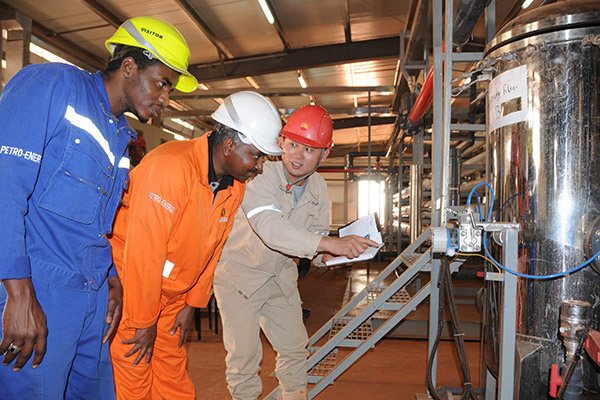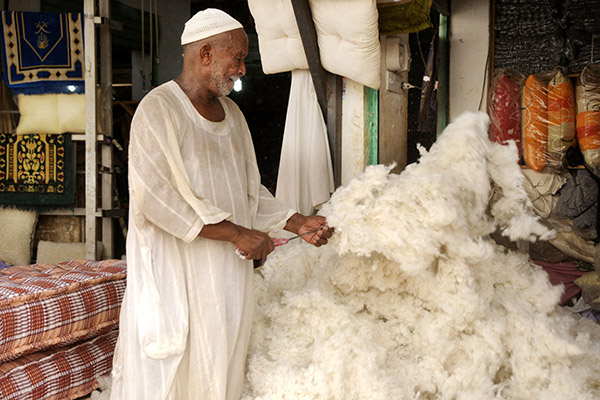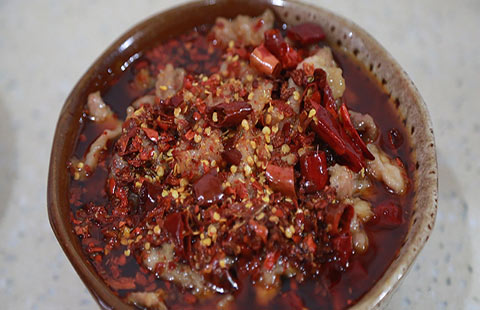Sino-African ties glitter with Sudan's 'gold'
 |
|
A Chinese expert shows local workers how to operate the machinery at an oil drill facility in Sudan. [Photo/Xinhua] |
KHARTOUM-Through fruitful and mutually beneficial cooperation with Sudan, China is turning the African nation's two major resources in black and white, namely oil and cotton, into gold.
The China-Sudan cooperation now shines as a model for developing Sino-African relations, showcasing China's contribution to Africa's development.
Thanks to the funding and technological aid from China, Sudan has largely achieved energy independence by establishing its own oil industry.
Similarly, China is helping Sudan transform its economy, through its efforts to create a cotton industry with a complete chain of production.
To illustrate the close economic and trade relationship between the two countries, China is the biggest trade partner for Sudan, which is the third largest African trade partner for China.
"Our relationship with China is historical, deeply-rooted and strategic. This is a model relationship that we hope will continue and shift to wider horizons," Awad Ahmed al-Jaz, a Sudanese presidential aide in charge of Sudan's ties with China, told Xinhua in an interview.
When Sudan and China signed a deal on building the Khartoum Refinery Co Ltd in 1997, no one expected it to become such a success story like it is today.
Located on the eastern bank of the Nile and 70 km north of Sudan's capital Khartoum, the 50-50 joint venture between Sudan's Ministry of Energy and Mining and China National Petroleum Corporation or CNPC has successfully turned the oil-rich African country from an importer of petroleum products to an exporter.
 |
|
A bedmaker in Sudan prepares cotton for use in mattresses and pillows. China is making efforts to help Sudan build a cotton industry, based on its successful experience in the oil industry. China has already achieved success in helping Sudan improve its cotton farming. [Photo/Xinhua] |
With the help of China's funding, technology and personnel training, the refinery was built in less than 20 months, and has expanded to increase its yearly output to 4.5 million metric tons.
It has not only met Sudan's domestic demand for petroleum and diesel but exported high-grade petroleum products to neighboring countries to earn the much-needed hard currencies.
A new city was also born around the refinery as it has attracted a number of petrochemical factories, power plants, oil-trading companies, and other service providers.
In the past 20 years, the Sudan oil industry, including the refinery and other oil-related investments, has generated over $100 billion in direct and indirect revenues for Sudan's economy, according to official estimates.
Jia Yong, general manager of CNPC International (Nile) Co Ltd, the Chinese partner of the Khartoum Refinery, said the facility is a model showing how China helps an African state achieve industrialization.
"The project has not only helped Sudan realize energy independence, but also ensured its safety of national energy supply," Jia told Xinhua.
In addition to the economic benefits, China's oil investments have also brought about huge social benefits for local communities. For example, China has trained a contingent of Sudanese oil engineers and technical workers, many of whom are later recruited by oil-rich Gulf nations.
Over the years, CNPC has contributed more than $120 million to varied charity and poverty relief projects in Sudan, by building and donating 104 schools, 50 hospitals and clinics, and 400 water wells, to fulfill its social responsibilities.
This refinery is so successful that several other African countries have requested China's help to build a similar one in their countries. "So far, we have made progress in helping Algeria, Chad and Niger build similar refineries, following the Sudan model," Jia said, adding that this model could be applied in China's Belt and Road Initiative.
In addition to oil, Sudan is also famous for growing quality cotton. But it has failed so far to establish a complete industry with a production chain from cotton farming, processing, to textile and clothing making.
Now, China is making huge efforts to help Sudan build a cotton industry, based on its successful experience in the oil industry.
China has already achieved success in helping Sudan improve its cotton farming. In Al-Faw in Al Qadarif state, 260 km southeast of Khartoum, a China-funded modern cotton research center, the China Aid Agricultural Technology Demonstration Center, has successfully introduced a new type of quality cotton seeds from China.
The seeds, named as China 1 by the Sudanese government, have notably increased cotton yields per mu (0.04 hectare) by 150 kilos. The seeds are so popular that 94 percent of Sudanese cotton farmers now plant them, earning an average of 8,400 Sudanese pounds ($1,259) in increased income per household a year.
In August last year, the Sudanese government and Chinese companies signed a Memorandum of Understanding to allow the latter to grow 1 million acres (405,000 hectares) of cotton in Sudan, including 112,000 hectares in Al Jazirah, a major cotton-growing state of Sudan.
In addition to cotton growing, Chinese companies plan to help Sudan build textile and ready-made clothing factories to complete the cotton industry's chain of production.
In the Al Rahad irrigation zone, China Shandong International Economic & Technical Cooperation Group joined hands with Shandong Lumian Group in 2012 to invest $50 million in building a 6,667-hectare modern farm of cotton farming and processing.
It envisions building a complete chain of production comprising cotton-growing, processing, textile manufacturing and garment-making factories, as well as animal farming and meat-processing facilities. Raw cotton seeds can be processed to make cooking oil, and leftovers can be turned into animal feed.
With help from China's ministries of commerce and agriculture, the farm has been training Sudanese in cotton farming and processing. So far, the Al Rahad farm has held four sessions of training under a three-year deal with the UN Food Programme.
"We have achieved an inspiring model in the field of oil industry and now we are heading toward turning agriculture into another model for cooperation after oil industry. We are now ready to make Al Rahad Agriculture Project a model for cooperation in the agricultural field," Awad Ahmed al-Jaz said.
Sudan, benefiting so much from the previous cooperation with China, is now eager to take advantage of the new opportunities offered by China's Belt and Road Initiative.
The initiative aims to build a trade and infrastructure network connecting Asia with Europe and Africa, by building roads, bridges, ports and other projects to seek common development and prosperity.
Al-Jaz said he was optimistic that the initiative would inject a new impetus to the China-Sudan ties as Sudan can serve as the link between the African continent and the Arab region.
Bushra Al-Sheikh Dafalla, a Sudanese diplomat and political analyst, told Xinhua that the partnership between the two countries has brought about many benefits, and Sudan needs to get more help from China in the field of infrastructure construction.
"China can establish land transport lines linking the Mediterranean Sea to Cape Town, which can connect the whole African continent across Sudan," he said, noting China's world-class railway construction expertise could be of big help in this regard.

























